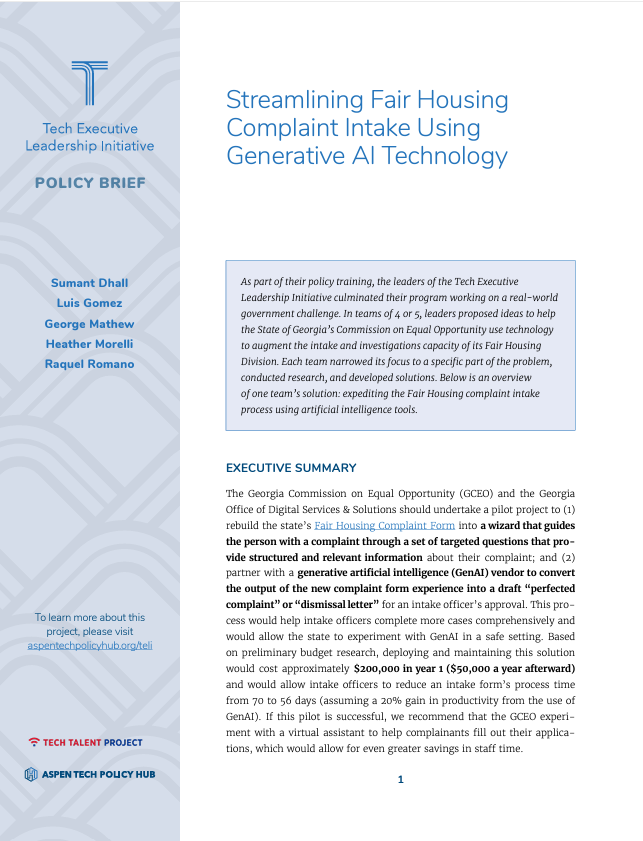
January 16, 2025
Aspen Institute Chatbot Project
Streamlining Fair Housing Complaint Intake Using Generative AI Technology
How can the State of Georgia’s Commission on Equal Opportunity improve the intake and investigations capacity of its Fair Housing Division? This project proposes expediting the Fair Housing complaint intake process using artificial intelligence tools. This project was completed as part of the 2024 Tech Executive Leadership Initiative (TELI) hosted in conjunction with the Tech Talent Project.

Background
The Georgia Commission on Equal Opportunity – Office of the Governor is a state agency that is responsible for safeguarding Georgians from discrimination in housing and employment. The GCEO’s Fair Housing Division is specifically responsible for enforcing the Georgia Fair Housing Law, which provides residents with protections in the rental, sale, purchase, or inspection of a dwelling based on the following protected classes: “race, color, religion, sex, disability, familial status, or national origin.”
Challenge
Georgia residents who believe that they are a victim of unlawful discrimination in housing may submit a formal inquiry form to the state for investigation. Once this form is filled out, a state intake officer follows up with the claimant to gather more information and ensure that the complaint is jurisdictional based on the Georgia Fair Housing Law and fits the agency’s statutory format. Once a claimant files a complaint with the assistance of an intake officer, the complaint is sent to the division’s Enforcement Unit for further investigation. The state typically receives around 1,750 housing related inquiries per year, and those inquiries are converted to about 250 official fair housing complaints per year.
The current intake form leads to inefficient outcomes. Only about 15% of submitted intake complaints are turned into formal complaints to be investigated by the GCEO investigators. The current intake form is ineffective because it has only a few structured input fields and many open text fields that require the complainant to use their own judgment about the type of information that will be useful for the GCEO to address their complaint. The intake must therefore be analyzed whether it is jurisdictional and reworded into the third person to comply with statutes. As a result, the intake officers spend most of their time a) obtaining missing information from the complainant; b) analyzing relevant information; c) determining whether the GCEO has jurisdiction3 over the issue (e.g. they have the ability to move the complaint forward); and d) rewording and reformatting the information to create the dismissal letter or the perfected complaint to be signed by the complainant, notarized, and handed off to the investigation team.
Proposed Solution
It was recommended that GCEO partner with the Office of Digital Services & Solutions to:
- Develop a guided complaint intake wizard to replace its current intake form. This new, guided experience would consist of conditional logic that guides the complainant through a set of questions aimed at obtaining structured and unambiguous information about their inquiry. The wizard would use this logic to produce a recommended determination of jurisdiction for review by the intake officer from an intake complaint dashboard.
- Pilot a GenAI-based letter generator for review by the intake officer that would draft a “perfected complaint” (that is, drafting and filing HUD Form 903) if the determined jurisdiction is “Yes” or a dismissal letter to close the case if the determined jurisdiction is “No.” The Office of Digital Services & Solutions should find a GenAI vendor to help develop this feature.
- Implement an automated appointment scheduler. If the complaint intake logic cannot determine the jurisdiction, and the intake officer reviews and approves the recommendation for a follow-up discussion with the complainant, a message would be automatically sent to the complainant with a link to the intake staff’s public calendar to book an appointment.
The guided intake wizard should be based on the rules that are currently implicitly or explicitly followed by intake staff. These rules are complex and not easily understood without training and time on the job. Due to the current retention concerns and understaffing, formalizing these rules into a guided form would 3POLICY BRIEF ease the training burden on new hires and tenured staff. Using GenAI to draft the perfected complaint (Form 903) or dismissal letter would reduce the tedious work of properly structuring and formatting these letters, and the requirement for human review would address concerns about bias and inaccuracies.